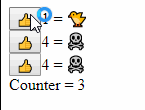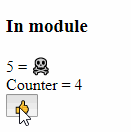Fable: React you can be proud of ! Part 2: Optimizing React
To optimize React we’ll need to dig into how it works and I’ll show a series of specific optimizations to use.
The post is part of a series on Fable / React optimizations split in 3 parts:
- React in Fable land
- Optimizing React (This one)
- Applying to Elmish
How does React work
The mechanism is described in a lot of details on the Reconciliation page of React documentation, I won’t repeat the details but essentially React Keep a representation of what it’s element tree is currently, and each time a change need to propagate it will evaluate what the element tree should now be and apply the diff.
A few rules are important for performance:
- Change of element type or component type makes React abandon any DOM diffing and the old tree is
destroyed in favor of the new one.
- This should be a rare occurrence, any big DOM change is pretty slow as it will involve a lot of destruction / creation by the browser and a lot of reflowing.
- On the other hand we want this to happen if we know that the HTML elements under some Component will drastically change: no need to force React to diff 100s of elements if we know that it’s a very different page that is shown. The diff also has a price.
- React mostly compares elements in order so adding an element at the start of a parent will
change ALL children. The
keyattribute should be used to override this behaviour for anything that is more or less a list of elements.- Keys should also be stable, an array index for example is a pretty bad key as it’s nearly what React does when there are no keys.
- The fastest way to render a component is to not render it at all, so
shouldComponentUpdate(AndPureComponentthat is using it) are the best tools for us. - Functional components are always rendered, but they are cheaper than normal ones as all the lifetime methods are bypassed too.
We can roughly consider for optimization purpose that each component in the tree is in one of these 4 states after each change (ordered from better performance-wise to worse) :
- Not considered (Because its parent wasn’t re-rendered) ❄️❄️
- Returned false to
shouldComponentUpdate❄️ - Render was called but returned the same tree as before 🔥
- Render was called but the tree is different and the document DOM need to be mutated 🔥🔥
PureComponent
The first optimization that is especially useful for us in F# is the PureComponent. It’s a component that only updates when one of the elements in its props or state changed and the comparison is done in a shallow way (by comparing references).
It’s ideal when everything you manipulate is immutable, you know, like F# records 😉.
Let’s take a small sample to see how it’s good for us. Test it as-is and with the Component replaced with a PureComponent :
type Canary(initialProps) =
inherit Component<obj, obj>(initialProps) // <-- Change to PureComponent here
let mutable x = 0
override this.render() =
x <- x + 1
div [] [ofInt x; str " = "; str (if x > 1 then "☠️" else "🐤️") ]
let inline canary () = ofType<Canary,_,_> createEmpty []
type CounterState = { counter: int }
type Counter(initialProps) as this =
inherit Component<obj, CounterState>(initialProps)
do
this.setInitState({ counter = 0})
let add = this.Add
member this.Add(_:MouseEvent) =
this.setState({ counter = this.state.counter + 1 })
override this.render() =
div [] [
canary ()
div [] [ str "Counter = "; ofInt this.state.counter ]
button [OnClick add] [str "👍"]
]
let inline counter () = ofType<Counter,_,_> createEmpty []
let init() =
ReactDom.render(counter (), document.getElementById("root"))
Before: 
After: 
While our canary has no reason to update, each time the button is clicked it will actually
re-render. But as soon as we convert it to a PureComponent it’s not updating anymore: none of its props or state change so react doesn’t even call render().
Beware: Passing functions
If you look in the previous samples, each time I pass a function it’s never a lambda declared directly in render() or even a member reference but it’s a field that points to a member.
The reason for that is that for react to not apply changes for DOM elements or for PureComponent
the references must be the same and lambdas are re-recreated each time so their reference would be different.
But members? Members stay the same so we should be able to pass this.Add and have it work. But
JavaScript is a weird language where passing this.Add would pass the method add without any this attached, so to keep the semantic of the F# language Fable helpfully do it for us and transpiles it to this.Add.bind(this) instead. But this also re-creates a reference each time so we must capture the bound version in a variable during the construction of the object.
It’s hard to prove it with the button so let’s prove it by moving the button creation to our lovely 🐤:
type CanaryProps = { add: MouseEvent -> unit }
type Canary(initialProps) =
inherit PureComponent<CanaryProps, obj>(initialProps)
let mutable x = 0
override this.render() =
x <- x + 1
div [] [
button [OnClick this.props.add] [str "👍"]
span [] [ofInt x; str " = "; str (if x > 1 then "☠️" else "️️️🐤️") ]
]
let inline canary props = ofType<Canary,_,_> props []
type CounterState = { counter: int }
type Counter(initialProps) as this =
inherit Component<obj, CounterState>(initialProps)
do
this.setInitState({ counter = 0})
let add = this.Add
member this.Add(_:MouseEvent) =
this.setState({ counter = this.state.counter + 1 })
override this.render() =
div [] [
canary { add = add }
canary { add = this.Add }
canary { add = (fun _ -> this.setState({ counter = this.state.counter + 1 })) }
div [] [ str "Counter = "; ofInt this.state.counter ]
]
let inline counter () = ofType<Counter,_,_> createEmpty []
let init() =
ReactDom.render(counter (), document.getElementById("root"))

Using toArray/toList and refs
It’s tempting in F# to use list expressions to build React children even when we have lists as it allows for a very nice syntax, but it can be a performance problem and force useless renders. Let’s see a problematic sample:
type CanaryProps = { name: string }
type Canary(initialProps) =
inherit PureComponent<CanaryProps, obj>(initialProps)
let mutable x = 0
override this.render() =
x <- x + 1
div [] [str (if x > 1 then "☠️" else "️️️🐤️"); str " "; str this.props.name ]
let inline canary props = ofType<Canary,_,_> props []
let goodNames = ["Chantilly"; "Pepe"; "Lester"; "Pete"; "Baby"; "Sunny"; "Bluebird"]
type CanariesState = { i: int; names: string list }
type Counter(initialProps) as this =
inherit Component<obj, CanariesState>(initialProps)
do
this.setInitState({ i = 0; names = [] })
let add = this.Add
member this.Add(_:MouseEvent) =
let name = goodNames.[this.state.i % goodNames.Length]
let names = name :: this.state.names
this.setState({ i = this.state.i + 1; names = names })
override this.render() =
div [] [
yield button [OnClick add] [str "🥚"]
yield! this.state.names |> List.map(fun n -> canary { name = n })
]
let inline counter () = ofType<Counter,_,_> createEmpty []
let init() =
ReactDom.render(counter (), document.getElementById("root"))

It seem that Chantilly survives but in fact it’s an illusion, a new element is always created at the end with his name, and all others are mutated.
So let’s fix it by exposing an array via toList and assigning an unique key to all our canaries:
type CanaryProps = { key: string; name: string }
type Canary(initialProps) =
inherit PureComponent<CanaryProps, obj>(initialProps)
let mutable x = 0
override this.render() =
x <- x + 1
div [] [str (if x > 1 then "☠️" else "️️️🐤️"); str " "; str this.props.name ]
let inline canary props = ofType<Canary,_,_> props []
let goodNames = ["Chantilly"; "Pepe"; "Lester"; "Pete"; "Baby"; "Sunny"; "Bluebird"]
type CanariesState = { i: int; canaries: (int*string) list }
type Counter(initialProps) as this =
inherit Component<obj, CanariesState>(initialProps)
do
this.setInitState({ i = 0; canaries = [] })
let add = this.Add
member this.Add(_:MouseEvent) =
let name = goodNames.[this.state.i % goodNames.Length]
let canaries = (this.state.i,name) :: this.state.canaries
this.setState({ i = this.state.i + 1; canaries = canaries })
override this.render() =
div [] [
button [OnClick add] [str "🥚"]
this.state.canaries
|> List.map(fun (i,n) -> canary { key = i.ToString(); name = n })
|> ofList
]
let inline counter () = ofType<Counter,_,_> createEmpty []
let init() =
ReactDom.render(counter (), document.getElementById("root"))

We could have kept using yield! instead of using ofList and it would have worked here
with only the keys but it’s better to always use ofList.
By using it an array is passed to React and it will warn us on the console if we forget to use
key.
It also creates a new scope, avoiding problems if we wanted to show another list in the same parent with keys in common (duplicate keys under a same parent aren’t supposed to happen).
Functional components in other modules
OBSOLETE: This problem doesn’t affect Fable 2
This is more of a current Fable issue/bug that might be solved at some point than something coming from React but it can wreck performance completely.
The problem is that while directly referencing a function like List.map foo will generate something like listMap(foo). Doing the same with a function that is exposed by a module List.map m.foo will generate listMap(foo.m.bind(foo)). It’s necessary when the target function is a javascript one as some of them require it but is useless for F# functions. Fable isn’t currently smart enough to differentiate them.
Fable was actually doing it for all function creating the problem for all Functional components but I fixed it in a PR released as part of Fable 1.3.8
This problem has exactly the same cause as the one evoked in Beware: Passing functions but it has a simple workaround: use the function via ofFunction in the same module in a non-inline function and expose that instead of the Functional Component itself.
// The variable need to be extracted because what happens is worse
// than just render() being called multiple time: The whole component
// is re-created on each change !
let mutable x = 0
type Canary(initialProps) =
inherit PureComponent<obj, obj>(initialProps)
override this.render() =
x <- x + 1
div [] [ofInt x; str " = "; str (if x > 1 then "☠️" else "🐤️") ]
let inline canary () = ofType<Canary,_,_> createEmpty []
module WrapperModule =
let Wrapper(props: obj) =
div [] [
h3 [] [str "In module"]
canary ()
]
// XXXXXXXXXXXXXXXXXXXXXXXXXXXXXXXXXXXXXXXXXXXXXXXXXXXXXXX
// Remove 'inline' here and the problem is solved, MAGIC !
// XXXXXXXXXXXXXXXXXXXXXXXXXXXXXXXXXXXXXXXXXXXXXXXXXXXXXXX
let inline wrapper () = ofFunction Wrapper createEmpty []
type CounterState = { counter: int }
type Counter(initialProps) as this =
inherit Component<obj, CounterState>(initialProps)
do
this.setInitState({ counter = 0})
let add = this.Add
member this.Add(_:MouseEvent) =
this.setState({ counter = this.state.counter + 1 })
override this.render() =
div [] [
WrapperModule.wrapper()
div [] [ str "Counter = "; ofInt this.state.counter ]
button [OnClick add] [str "👍"]
]
let inline counter () = ofType<Counter,_,_> createEmpty []
let init() =
ReactDom.render(counter (), document.getElementById("root"))
Before: 
After: 
Letting React concatenate
While it’s only important with very frequent updates a little detail that can be interesting to look at is how strings are concatenated. The 3 choices are (from better to worse performance):
override this.render() =
ul [] [
// React will use it's DOM diffing and provide very fast update
li [] [ str "Hello, "; str this.props.name]
// Javascript concatenation is a also very fast
li [] [ str ("Hello, " + this.props.name)]
// sprintf is more complex and slower, it's perfectly fine for
// elements that don't render very often but it's not free
li [] [ str (sprintf "Hello, %s" this.props.name)]
]
That’s all folks
Not a lot more to say, avoid render(), don’t kill the 🐤️🐤️🐤️ in the Fable mine and everything
will be fine !
Next article will be on Elmish and how it ties with all of that.